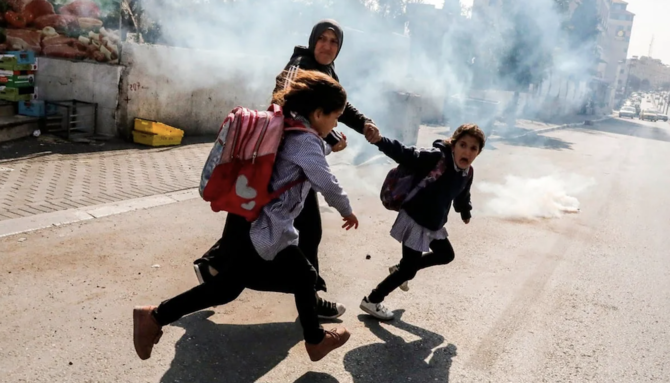RAMALLAH: Palestinians have accused Israeli authorities of waging war on the Palestinian schools and curriculum in East Jerusalem before the start of the new academic year on Sept. 1.
The Israeli authorities are trying to impose the Israeli curriculum on six Palestinian schools.
The parents of the students have rejected the move as they prefer the Palestinian curriculum to be taught to their children.
They say the Israeli authorities’ “attacks” on Jerusalem’s schools have escalated through a series of decisions, procedures and threats to impose Israeli education policy on Palestinian students, who otherwise face penalties including the closing of those schools and preventing students from benefiting from education services.
The Israeli Ministry of Education canceled the permanent license for six schools in Jerusalem; five of them belong to Al-Eman schools and one to the Abrahamic College, converting them into temporary permits for a year in an attempt to pressure them to abandon teaching the Palestinian curriculum and replace it with the Israeli curriculum.
The canceling of licenses does not clarify whether the decision means withdrawing licenses and closing schools permanently or cutting funding and allocations from the ministry only.
The ministry recently sent a letter to several schools in the city titled “Textbooks containing inflammatory content in East Jerusalem schools.” It threatened to withdraw its license if “an educational institution is found to teach textbooks that contain inflammatory materials.”
In past years, the Israeli authorities have tried to impose conditions on education in East Jerusalem schools. The most prominent of these conditions was teaching the “distorted Palestinian curriculum in its affiliated schools,” which appears to be identical to the Palestinian curriculum. However, many lessons, pages and symbols were deleted from them. Still, schools and parents of students were able to withstand this.
Parents of students of the targeted schools distributed the non-distorted Palestinian curriculum to students on Saturday, confirming the student’s right to study it.
About 50,000 students study in the schools affiliated with the Israeli Jerusalem Municipality and the Israeli Ministry of Education; 13,000 of them study the Israeli curriculum while 37,000 study the distorted Palestinian curriculum.
Also, 42,000 students in private schools in Jerusalem are studying the Palestinian curriculum while they are targeted and imposed on the distorted Palestinian curriculum.
The Abrahamic College Parents Committee said that the distortions made by the Israeli authorities on this Palestinian curriculum represented clear violations of the right of students and their families to choose their curriculum, as the move is inconsistent with the Oslo Accords signed between the Palestinian Authority and Israel.
For years, Israel has been protesting against the Palestinian educational curricula that are taught in East Jerusalem schools or public and private schools in the West Bank, in addition to UNRWA schools, accusing it of inciting content against the Jewish state. At the same time, Israel complained against the Palestinian Authority to the EU, which stopped the payment of millions of US dollars in financial aid to the authority, demanding it removes the “inciting content.” The PA completely denies the Israeli allegations.
Parents of the students are concerned about the Israeli measures and threats to the schools of Jerusalem, considering them as a prelude to imposing the teaching of the entire Israeli curriculum in those schools in future.
The parents said that by taking these actions, Israel wanted to harm the Palestinian identity and separate people from their history and ideology.
The PA Ministry of Jerusalem Affairs demanded that Jerusalemite students, parents and school administrations should adhere to the original Palestinian curriculum and reject the Israeli one and its distorted version.
The ministry said: “The comprehensive interaction by students and parents of students at the Abrahamic College School is a clear message to the occupation, rejecting the Israeli curriculum and the distorted curriculum through which the occupation seeks to erase the Palestinian identity.”
The Islamic-Christian Committee to Support Jerusalem and the Holy Sites said that the adherence to the Palestinian curriculum constitutes a clear message to the occupation that Jerusalemites adhere to their national identity and are determined to thwart any plan to Judaize education in their city.
Ibrahim Melhem, the spokesman for the Palestinian government, told Arab News that Israel is seeking to control the schools in East Jerusalem through extortion.
“This is a challenge, and we will not accept being blackmailed. The Palestinian Authority will pay money to these schools to support and strengthen their steadfastness and enable them to confront Israeli extortion,” he said.




























